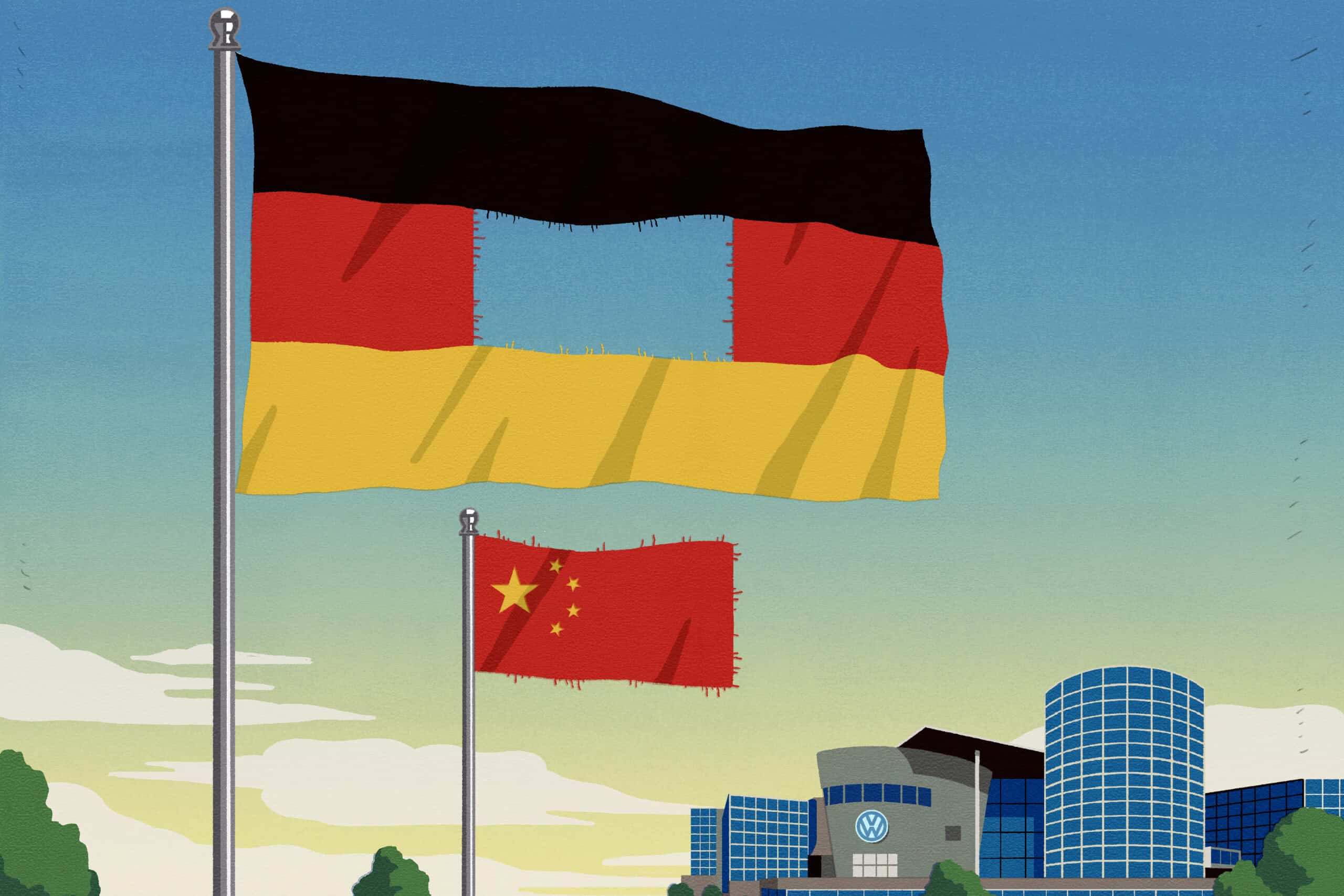
Credit: DKMcLaren, Creative Commons
Citing security concerns, the White House and Congress have been stepping up their efforts to restrict Chinese telecommunications and transportation companies from operating or selling goods in the United States.
The moves come at a time when relations between the two countries have soured over the handling of the Covid-19 pandemic. President Trump on Thursday threatened new tariffs against China for its alleged cover-up of the outbreak before it spread globally.
Tariffs have been the biggest weapon in the ongoing trade dispute between the two counties and remain in force on up to $370 billion in Chinese imports. But recently, the federal government has also been busy enacting laws and taking new regulatory actions aimed at the American operations of Chinese companies, including the telecom giant Huawei and some of China’s biggest state-owned phone service providers.
U.S. authorities have also taken aim at China’s big transportation equipment makers, such as BYD, one of the country’s largest electric battery and vehicle makers, and CRRC, a state-run railway car maker that produces subway cars.
“The tariff war is a short-term tactic to open up China’s market and promote American exports,” said Scott Kennedy, a senior advisor at the Center for Strategic and International Studies, a Washington based think tank. “The actions against Chinese companies are part of a larger technology competition.”
Kennedy said that in addition to restricting Chinese access to the U.S. market, there are likely to be other measures aimed at China, including additional export controls and even restrictions on U.S. companies investing in China. If those moves go forward, he said, it could set the stage for China to retaliate with restrictions of its own, aimed at American companies operating in China.
The U.S. moves are fueled by a growing sense that China is now a strategic rival that gains advantages by using a mix of industrial policies, cyber attacks, intellectual property theft and unfair trade practices; and that its growing pursuit of new 5G cell phone technologies could empower its companies to spy on the U.S. and its allies.
Some of the restrictions being pushed by the Trump administration seem to be aimed at preventing Chinese firms from tapping into American telecommunication networks and listening into calls or accessing online messages.
For instance, last week, the Federal Communications Commission told four Chinese internet- and phone-service providers that they have 30 days to explain why the agency should not revoke their licenses to operate in the U.S. The agency said China Telecom Americas, China Unicom Americas, and two subsidiaries of CITIC Telecom International — all state-owned Chinese companies — are vulnerable to the “exploitation, influence and control of the Chinese Communist party,” posing a risk to the security of the U.S. telecommunications grid.
The four companies were targeted, in part, because of a federal inter-agency report identifying China Telecom as an espionage threat. The FCC told China Unicom and the two CITIC units that it was concerned about them because they are ultimately controlled by the Chinese government. Representatives for the American-based subsidiaries of China Telecom and CITIC told The Wire that they are trying to convince the FCC not to revoke their licenses, though the two companies did not elaborate on their arguments.
Washington has also taken aim at Huawei, one of the world’s biggest mobile phone and telecom equipment makers. In March, the Congress enacted a law that mandates that no federal money can be used to pay for goods or services from a company designated as national security risk by the FCC. The FCC had already made an initial designation of Huawei as a risk, pending a final ruling, because of its alleged ties to the Chinese government and the military. The commission said that Chinese law would obligate Huawei to comply with a Chinese government request to use or access Huawei’s systems, which means the company could pass along American data flowing through U.S. networks.

Credit: AP Photo/Charles Krupa
The measures, though, could hurt providers of phone and internet services in rural America, which receive federal funds to help them provide services they otherwise couldn’t afford. Because many of these providers already use Huawei’s low-priced equipment, analysts say that if the FCC makes a final designation of Huawei as a security threat, the rural service providers could be forced to pay the high cost of replacing the equipment.
The law, enacted in March, provided for a reimbursement program to help the rural phone companies reduce the cost of replacements, and indicated that the government was prepared to spend up to $1 billion to help. But two days after the law was passed, the FCC asked Congress for an additional $1 billion for the fund, a sign that removing Huawei from American networks may be far more costly and difficult than lawmakers had forecast.
Jim Kail, the president and chief executive of LHTC Broadband, which serves about 7,000 customers in rural Pennsylvania, said the law puts a huge burden on small firms.
“It’s going to be costly in the way of time and effort, and as far as the money goes, I’m not sure the extent it is going to be reimbursed,” said Kail, whose company uses Huawei equipment. He added, replacing the equipment would mean “we’re going have to put off other projects for other underserved or unserved areas.”
In an April 22 letter to the Department of Commerce, the Rural Wireless Association, a Washington-based trade group that represents telecom and internet service providers, predicted a “complete disruption of mobile communications in many parts of rural America” if carriers are blocked from keeping and repairing Huawei gear already installed.
The FCC did not respond to a request for comment.
Washington’s growing concern about China also extends to transportation equipment. For instance, a law enacted last December bars public transit systems from using federal funds to procure railway cars and other vehicles from countries that are non-market economies.
The two companies most likely to be affected by the new law are CRRC, the world’s largest maker of rail cars, and BYD, which produces electric buses and cars. At the time, the law was being debated on Capitol Hill, the two Chinese companies had already won contracts to supply several U.S. transit systems.
But people involved in the legislative process say that a few congressmen who had CRRC and BYD plants in their districts managed to carve out an exemption at the last moment.

Credit: Edward Orde, Creative Commons
One of them was Rep. Richard Neal, a Massachusetts Democrat and chairman of the House Ways and Means Committee. Rep. Neal’s district includes Springfield, Mass., which is home to a CRRC factory that makes rail cars for the Boston subway system. CRRC and BYD have contracts in the U.S. worth $3 billion from transit systems in Boston, Philadelphia, Chicago and Los Angeles. The factories employ about 1,000 U.S. workers, according to the companies. Rep. Neal could not be reached for comment.
“You stand up and say I want to be tough on China, but when push comes to shove there’s a cost to it,” said Derek Scissors, a resident scholar at the American Enterprise Institute, a conservative think tank in Washington. Jobs, Scissors said, often outweigh abstract national security concerns.
The exemptions protect existing contracts from the federal funding ban, and allow transit systems in the four cities to continue to sign new contracts with Chinese companies.
According to the exemption written into law, the Chinese companies still have 20 months to grow their public transit businesses and unlimited time afterwards to build and service their vehicles. The electric bus maker BYD, for instance, continues to sell to American public transit systems and the company is even bidding to build a monorail in Los Angeles that is expected to cost at least $9 billion and open in the late 2050s.
In its final version, the measures in the law will not go into effect until December 2021, except for the Washington Metro, for which it applies immediately.

Eli Binder is a New York-based contributing writer for The Wire. He previously worked at The Wall Street Journal, in Hong Kong and Singapore, as an Overseas Press Club Foundation fellow. @ebinder21



